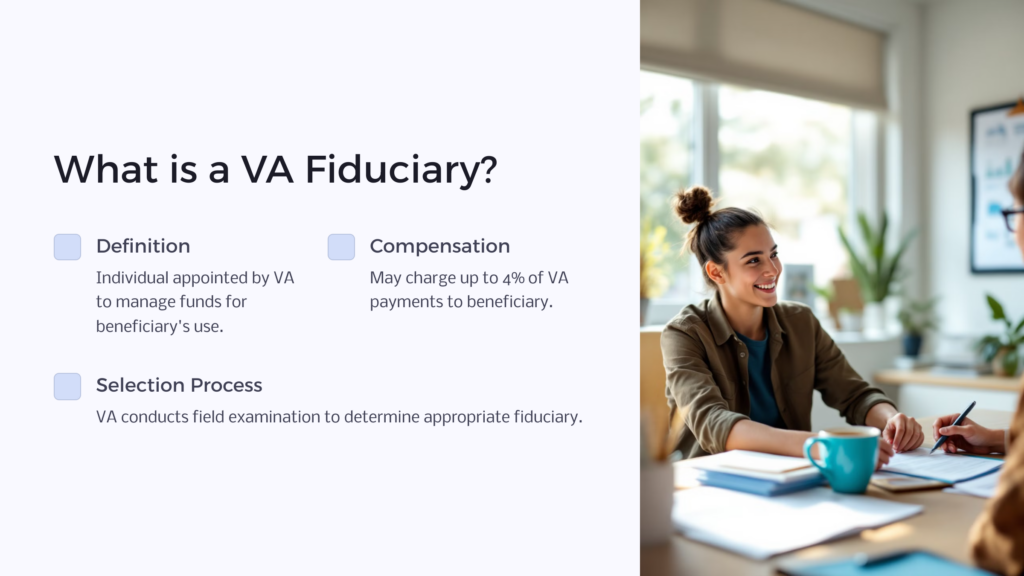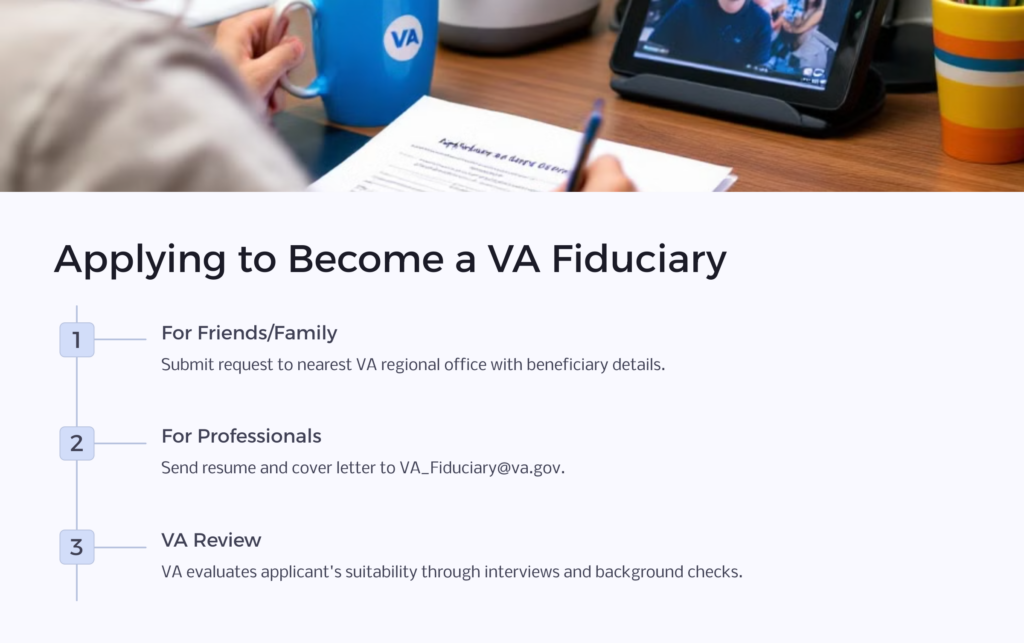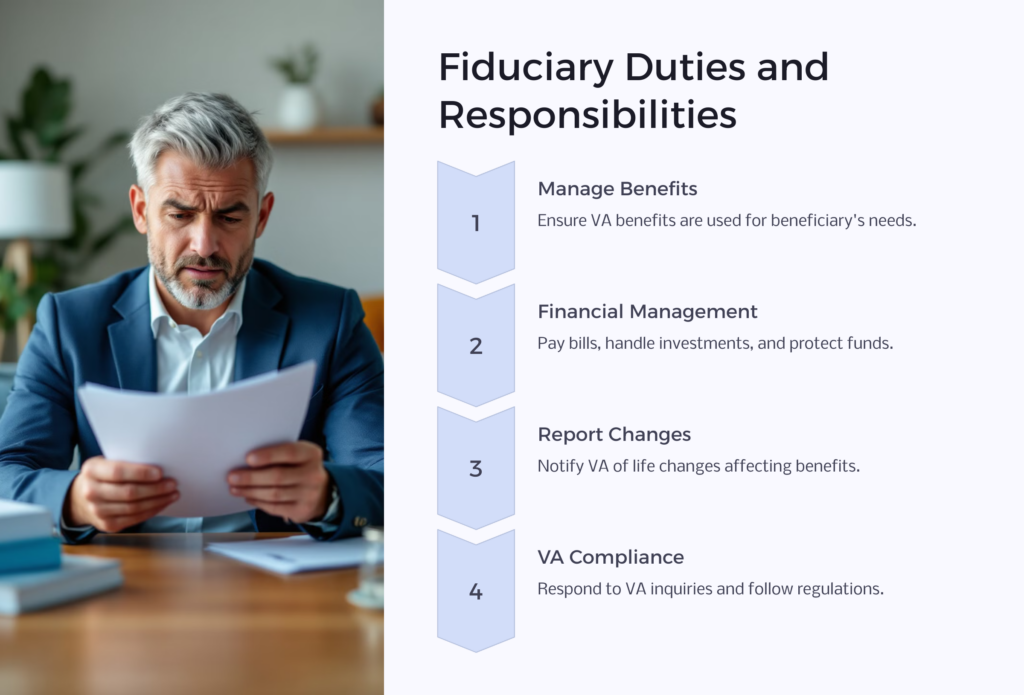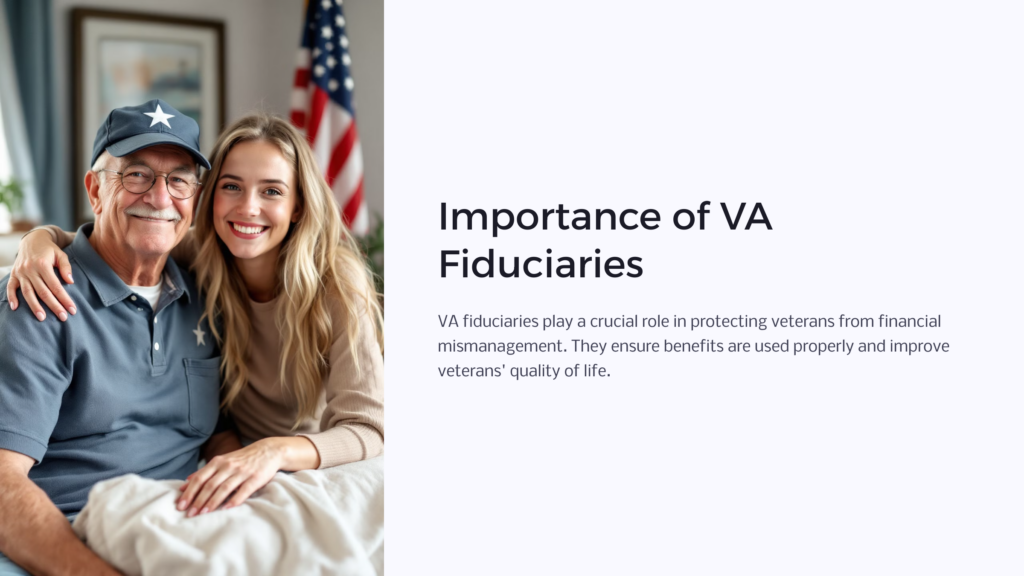In support of America’s veterans, the U.S. Department of Veterans Affairs administers the VA Fiduciary Program to ensure that benefits and finances are managed properly and are used solely for the well-being of the beneficiary and/or his or her dependents.
Having a fiduciary program in place protects beneficiaries who are unable to make financial decisions on their own, ensuring that their health and well-being are prioritized and that long-term assets are protected.
6 Facts About the VA Fiduciary Program
- What Is a VA Fiduciary?
- Who May Serve as a VA Fiduciary?
- FAST: VA Fiduciary Accountings Submission Tool
- Apply To Become a VA Fiduciary
- How Does the VA Choose a Fiduciary?
- VA Fiduciary Duties and Responsibilities
Through the course of the VA disability consideration and approval process, the beneficiary of VA benefits may be deemed incapable of effectively managing their financial benefits. This can happen when the VA has received medical documentation of incompetency or when a court of competent jurisdiction issues a determination to that effect.
A VA beneficiary is typically unable to manage their financial affairs as a result of injury, disease, infirmities associated with advanced age, or a mental health disability.
Below are some of the key points you should understand about the VA fiduciary program, which allows qualified individuals to manage VA disability benefits and the veteran’s finances on behalf of a U.S. veteran suffering from a medical condition with a service connection.
What Is a VA Fiduciary?

A VA fiduciary is an individual or other entity that has been appointed by the VA to receive funds on behalf of a beneficiary for the use and benefit of the beneficiary and their dependents. In other words, the appointed fiduciary receives the VA disability benefits and then uses the veteran’s finances to pay for essential goods and services that support the overall quality of life for the veteran.
How much does a VA fiduciary get paid?
The fiduciary is allowed to charge a fee of up to 4% of the amount the VA pays to the beneficiary.
If the VA has deemed a veteran to be incompetent and unable to manage their veterans benefits, the VA will carry out a field examination to determine the most appropriate fiduciary. The VA typically seeks a trustworthy friend or family member who can manage the veteran’s expenses and financial affairs with the least amount of disruption. During the field visit, the VA will examine a beneficiary’s financial information to determine the scope of assistance needed.
Brady Handgun Violence Prevention Act
The designation of incompetency extends beyond the ability to manage financial affairs. According to the Brady Handgun Violence Prevention Act, individuals deemed incompetent may not purchase, possess, receive, or transport a firearm or ammunition.
In compliance with this act, the VA reports all names of incompetent VA beneficiaries to the FBI. These names are added to the National Instant Criminal Background Check System, which is cross-referenced by gun dealers before selling any firearms or ammunition. The VA beneficiary may submit a request to the VA for the firearms restriction to be lifted.
Appealing a Decision
When the VA determines a disabled veteran is incompetent and assigns a VA fiduciary, the beneficiary has the option to appeal the decision.
In these cases, the veteran should follow the process outlined below:
- Submit a request for appeal to Veterans Appeals, asking for either the designation of incompetency or the choice of fiduciary to be reviewed. You can submit your request to the fiduciary hub of jurisdiction.
- Supply any additional documentation or medical evidence that helps strengthen your claim and offers the Board of Appeals new insight into your situation.
Can a VA Fiduciary Be Fired?
What if the veteran feels the fiduciary isn’t doing a good job? The veteran has the right to appeal the VA’s choice of appointed fiduciary. An incompetent veteran fiduciary can be removed if there is evidence a misuse of funds or failure to perform the required duties.
There are two ways to appeal the choice of VA fiduciary. If you have evidence of wrongdoing, you can simply send it to the VA for review. You can also formally appeal to the Board of Veterans’ Appeals.
Who May Serve as a VA Fiduciary?
Anyone who goes through the VA’s fiduciary process can be named a VA fiduciary if approved. In most cases, fiduciaries tend to be spouses, though other family members and friends also often play this role. The VA also will consider the beneficiary’s choice of fiduciary whenever possible.
In some cases, a qualified caregiver may serve as a fiduciary, along with a chief officer of an appropriate institution, a bonded officer of a recognized Native American tribe, or a person specifically appointed by a court, which may be an attorney.
FAST: VA Fiduciary Accountings Submission Tool

The VA Fiduciary Accountings Submission Tool is a user-friendly online submission platform that streamlines the process for accounting submission and reviews. This centralized repository also gives external fiduciaries greater visibility into the accounting submission process.
Fiduciaries may self-register for FAST through the Access VA Website, which involves setting up an account, complete with passcode. You will also be asked to verify your identity and to provide some personal information, including your Social Security number.
Once you’ve completed the self-registration process, you will receive notification from the VA that your account has been approved. At this point, you’ll be able to log into the FAST system and begin using it to document financial transactions you make on behalf of the VA beneficiary.
Apply To Become a VA Fiduciary

If you would like to serve as a VA fiduciary for a friend or family member, you can apply by submitting your request to your nearest VA regional office. Be sure to include the beneficiary’s name and VA file number, your contact information, and your request to be the fiduciary.
If you would like to become a professional fiduciary, submit your resume and cover letter to VA_Fiduciary@va.gov. Include your name, the name of your organization, if applicable, your mailing address, and your email address with your submission.
Once the VA has received your request to become a fiduciary, it will begin the formal VA fiduciary process.
How Does the VA Choose a Fiduciary?
When considering someone for the role of appointed fiduciary, the VA will consider the following characteristics:
- The applicant’s willingness to take on the fiduciary duty – as evidenced by the cover letter, resume and additional documentation the applicant provides, along with information gleaned during an interview with a VA representative.
- The applicant’s ability to carry out his financial responsibilities, as evidenced through credit report review and interview with a VA representative
- The absence of criminal behavior, as evidenced through a criminal background check
- The overall character and ability to serve the best interests of the beneficiary, as evidenced through interviews with character witnesses
Once the VA approves a fiduciary, both the proposed fiduciary and the VA beneficiary will be notified and both will be asked to attend a meeting with a VA field representative to outline roles and responsibilities moving forward. During this meeting, the fiduciary typically receives all appropriate financial information needed to take over financial responsibilities on behalf of the VA beneficiary.
Please know that once selected, fiduciaries are subject to periodic onsite reviews by the VA to safeguard against fraud. The VA ensures that the fiduciary carries out their duties with the best interests of the beneficiary in mind. A site review will include a meeting with the VA beneficiary to ensure that her needs are effectively being met.
VA Fiduciary Duties and Responsibilities

The main responsibility of a fiduciary is to ensure that all VA benefits and disability compensation are used for the good of the beneficiary. At no point can the beneficiary’s VA benefit payment be used for anything other than supporting the needs and personal care of the VA beneficiary and any dependents. The fiduciary at no time is allowed to loan, gift, or borrow any of the funds that rightfully belong to the VA beneficiary.
In some cases, a fiduciary may be called upon to help a veteran file a VA disability claim or request a rating increase. This can help maximize the benefits the veteran is entitled to receive. If the veteran is unable to submit claims and gather medical evidence, the fiduciary can step in and help.
As a fiduciary, you have all the beneficiary’s bills sent to you directly. You can use VA benefit funds to pay for bills and household expenses on behalf of the beneficiary – such as mortgage or rent, utilities, clothing, and groceries. You are also responsible for paying any applicable income tax on behalf of the beneficiary, along with collecting rents or any unpaid debts.
Your commitment as a fiduciary also obligates you to place the beneficiary’s funds in a reasonable, safe investment vehicle and to do everything in your power to protect those funds from loss and creditors. You may be required to meet additional obligations if the VA chooses, including making sure that the VA beneficiary receives all necessary and appropriate medical care.
In addition to responsibilities owed to the beneficiary, the fiduciary also has some obligations to the VA. First, it’s important to note that any changes to the beneficiary’s circumstances that may affect his eligibility for VA benefits should be immediately reported to the VA. For example, you may need to appropriately report life changes that include any of the following:
- A life change that either increases or decreases the beneficiary’s VA benefits amount
- A life change that requires an adjustment to how VA funds are used on the beneficiary’s behalf
- A life change that indicates that the beneficiary can manage her own VA benefits
Typical life changes that should be reported include marriages, divorces, change of address or telephone number, birth of a child, incarceration or felony conviction, a sudden change in medical condition, hospitalization, or death.
In addition to reporting changes in circumstances, a fiduciary is required to respond to any outreach from the VA in a timely manner, meet with VA personnel when requested, and comply with all VA regulations. From time to time, the VA may reach out to you with questions regarding the beneficiary’s circumstances, and you should respond as soon and as accurately as possible.
Understanding the VA Fiduciary Program
Through the VA’s Fiduciary Program, the VA can ensure that all benefits distributed on behalf of U.S. veterans are used in the veteran’s best interests – especially in cases where a beneficiary has been deemed unable to make sound financial decisions on her own.
A VA fiduciary can help make sure the veteran claims all the benefits they are eligible to receive. They can assist the veteran with filling out forms and submitting documents such as filing a disability claim or a claim for an increased rating. The importance of the fiduciaries who participate in this program cannot be overstated. VA fiduciaries help ensure that all veterans are protected from financial mismanagement and they work to improve the veteran’s quality of life.

 Benefits.com Advisors
Benefits.com Advisors
With expertise spanning local, state, and federal benefit programs, our team is dedicated to guiding individuals towards the perfect program tailored to their unique circumstances.
Rise to the top with Peak Benefits!
Join our Peak Benefits Newsletter for the latest news, resources, and offers on all things government benefits.



















